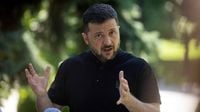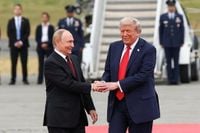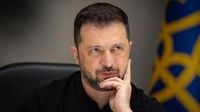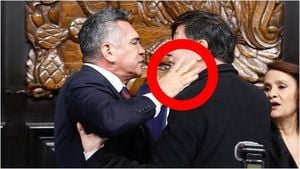As the war between Russia and Ukraine enters its fourth year, diplomatic efforts to bring about peace are ramping up, but the road ahead is fraught with obstacles, hesitation, and hardline stances on all sides. On August 29, 2025, Ukrainian President Volodymyr Zelenskyy made clear that his government is eager to meet with U.S. President Donald Trump and European leaders in the coming week to discuss recent developments and inject new momentum into the sluggish peace process. The announcement comes at a time when Ukraine faces relentless aerial assaults from Russia, adding urgency to the calls for negotiations and international support.
According to Spectrum News, Zelenskyy expressed frustration with what he described as Russia’s lack of constructive engagement, even as the Kremlin continues to launch devastating missile and drone attacks against Ukrainian cities. In a particularly harrowing incident between August 27 and 28, at least 23 people—among them four children—were killed in Kyiv after Russia unleashed nearly 600 drones and more than 30 missiles, with some strikes hitting the heart of the capital. Flags flew at half-staff across the Kyiv region, which declared an official day of mourning. Rescue workers pulled 17 people, including children, from the rubble, but eight people remained unaccounted for, and more than 50 were wounded.
“In my opinion, leaders must urgently be involved to reach agreements,” Zelenskyy told reporters, signaling his belief that high-level engagement—rather than endless technical discussions—was needed to break the deadlock. He accused Moscow of dragging out negotiations by insisting that groundwork for a possible peace settlement must be thrashed out by lower-level officials before the leaders could meet. “That reasoning is artificial … because they want to show the United States that they are constructive, but they are not constructive,” he added.
For his part, President Trump has shown both impatience and caution regarding the peace process. According to Censor.NET, Trump has not lost interest in helping to end the war, but he believes that a bilateral meeting between Zelenskyy and Russian President Vladimir Putin should come before any trilateral talks involving the United States. Zelenskyy clarified that Trump’s recent comments about not wanting to be involved in talks may have referred specifically to that initial meeting between the Ukrainian and Russian leaders. “No, no, I had a very good conversation with him, really. He understands that this is not an easy path,” Zelenskyy said. “Trump wants to succeed, for himself and for the United States, and he understands that during the first meeting he is unlikely to succeed. But I am certain that if we are all strong enough, we will achieve success.”
The complexity of the negotiations is heightened by Russia’s apparent reluctance to engage meaningfully. During a recent briefing, Zelenskyy stated that Russia is actively trying to prevent a meeting between himself and Putin, and is working to delay new U.S. sanctions against Moscow. “In my view, they gained something during their meeting with the United States. It’s understandable, because initially the meeting was proposed as a trilateral one,” Zelenskyy explained, as reported by Suspilne. “Today there is what Trump proposed – a bilateral meeting, and then a trilateral. The reasons are different. I think the American president has his own view on this. But we support one format or another.”
While Ukraine has accepted a U.S. proposal for a ceasefire and a meeting between the two presidents, Moscow has raised objections, arguing that any summit must be preceded by deep preparation at the expert and ministerial levels. Russian Foreign Minister Sergey Lavrov, quoted by NBC News, said that Putin is ready to meet Zelenskyy only after such groundwork is completed. Kremlin spokesperson Dmitry Peskov echoed this sentiment, stating, “At this point we can't say that the expert work is in full swing, so to speak. No, unfortunately, not. We maintain our interest and our readiness for these negotiations.”
The international community continues to play a crucial role in shaping the framework for talks. On August 18, the United States announced preparations for a potential meeting between Zelenskyy and Putin after consultations with European leaders and a call to Putin. However, on August 21, Lavrov insisted on the need for deep preparation, and by August 24, he dismissed reports of an imminent summit as mere rumors. When Russia continued to stall, Trump warned on August 26 that the United States would begin an “economic war” against Russia if its leadership evaded negotiations.
Sanctions remain a key lever in the West’s strategy. Zelenskyy has repeatedly called for the United States and Europe to intensify their pressure on Russia, emphasizing the need for tighter energy policies, secondary sanctions on countries and companies aiding Russia, and coordinated action on nuclear cooperation. “There is a strong desire from the United States, and Putin will be at the negotiating table. After all, they have not yet felt losses to their economy, unfortunately. Therefore I think this should be paid attention to. There are secondary sanctions, tariffs, sanctions on some products, sanctions on some companies. We must push the shadow fleet to the end. Good steps have been taken, but there is still a lot to work on there. Push on energy policy. Push on nuclear cooperation, establish sanctions. The nineteenth package is currently under consideration. It will come, this is good news,” Zelenskyy said, as reported by Suspilne.
Despite these efforts, Russia’s justification for the war—so-called “denazification” of Ukraine—has found little support internationally. “There is no global support. They are aggressors. 143 countries voted in the UN for this. That means they are responsible for this war; the side at fault must end the war. And it will happen anyway, in one form or another,” Zelenskyy insisted.
In the background, the United States and European nations are also weighing postwar security guarantees for Ukraine to deter future aggression. These could include a secure supply of weapons—either through domestic production or Western provision—as well as U.S. weapons paid for by Europe. The Atlantic Council, a Washington think tank, recently observed that while Washington and its allies have the capacity to reverse Russia’s gains in Ukraine, there is skepticism in Moscow about whether the United States has the will to do so. The think tank further noted, “The second Trump administration has repeatedly signaled that the United States has no vital interests at stake in this war.”
As the world watches, the next round of meetings between Ukrainian, American, and European leaders could prove pivotal. Whether these talks will break the diplomatic impasse or become yet another chapter in a protracted conflict remains to be seen. For Ukraine, the stakes are existential—and for the international community, the outcome will shape the future of European security for years to come.






